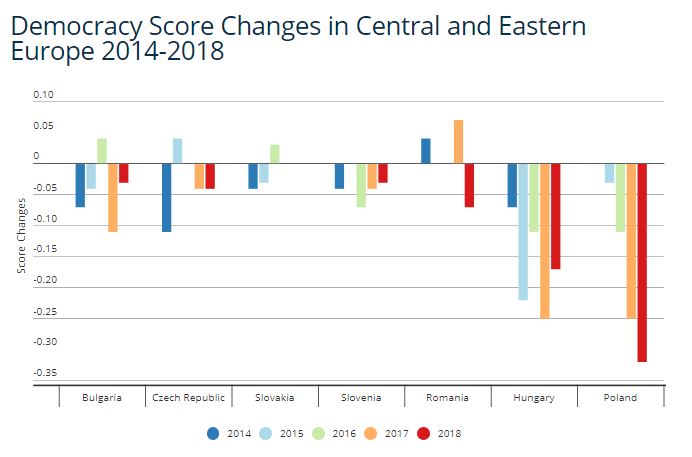The newest Freedom House “Nations in Transit” report has revealed the biggest overall decline of democracy in the tracked countries in 23 years of the project’s history. Even in the 19 (out of 29) former Eastern Bloc countries monitored by the project, the state of democracy has degenerated in a year. It is the second year in a row when there are more consolidated authoritarian regimes than consolidated democracies in the region.

The most dramatic decline of the quality of democracy has been registered in Poland, where the government is criticized for controlling the judiciary system, politicizing the media, slander campaigns against non-governmental organizations, and violation of parliamentarian procedures. This is the second biggest decline of the quality of democracy throughout the history of the research project. Meanwhile, Hungary stands out in the report as the state of democracy there has been degenerating for ten years by now.


The authors of the report draw our attention to one tendency that causes concern in the region. Russia started a campaign against non-governmental organizations in 2012. Foreign NGOs and investigative journalists have started to be called “foreign agents” and in pro-government media are labeled mere hirelings serving strangers. As Freedom House remarks, this practice has spread to most of the former Eastern Bloc countries: first to Central Asia and Azerbaijan, now to Central Europe and the Balkans too. In the last three years, experts who worked behind the “Nations in Transit” report have registered slander campaigns against NGOs and free media in all of the tracked countries except the Baltics and Slovenia.

In this case, it is not necessarily the legal constraints to NGO or media that are discussed. The slander campaigns that aim at delegitimizing NGO and media participation in public debates are enough. The aim is to show that only those who were elected by the majority, that is the ruling party, can talk about the questions related to public interests. The example given is that of Hungary’s ruling party’s campaign against George Soros, a philanthropist established in the US, and the organizations funded by him. The caricatures, reminding of the most abhorrent anti-Semitic European traditions, portrayed Soros as a person manipulating the opposing Hungarian politicians, NGOs, and the media.
The authors of the report claim that politicians use the slander campaigns because they are effective. The report highlights the importance of unwritten agreements encouraging politicians to refrain from this unscrupulous tactic which does not aim at discussing arguments or ideas, but simply at people or organizations themselves, in order to take away their public voice. This tactic deprives the politicians of their responsibility to react to arguments with arguments and allows them to brush everything off saying that people behind the resurfacing inconvenient facts are spreaders of fake news, agents serving foreign and not their own country, etc.
The current situation shows that it is necessary to increase moral and material support for the non-governmental sector and quality media.

Hungarian regime’s fight against Soros

As an example of how the politicians exploit slander campaigns against their opponents, we can remember Hungary Prime Minister Viktor Orban’s fight against the philanthropist George Soros and the non-governmental organizations funded by him. On 9 October 2017, Hungary’s government sent out a survey to all 8 million Hungarian citizens who have the right to vote, and they were asked about their opinion on the so-called “Soros Plan.” This survey exploited numerous false facts concerning the philanthropist’s activity. It claimed that Soros aimed that Brussels would relocate 1 million immigrants in the European Union, including Hungary. In truth, Soros in his 2015 article argued that because of the war in Syria the EU will have to “accept at least 1 million people applying for the refugee status very soon.” He argued that this burden should be split by the EU member countries fairly. In a year, when the situation changed, in the article “Saving refugees to save Europe,” he claimed that Europe should already pledge to accept only 300,000 refugees.
The Hungarian government also tried to convince the electorate that Soros together with EU officials are planning to abolish EU borders in order to open the way for immigrants. Whereas in the same text mentioned earlier, „Saving Refugees to Save Europe,“ G. Soros wrote that “the EU must regain control of its borders” and “the EU must build common mechanisms for protecting borders, determining asylum claims, and relocating refugees.”
It was also explained in the survey that the “Soros Plan” is seeking a compulsory relocation of the refugees executed on an EU-wide scale, especially in the Eastern European countries. In fact, in the same article Soros explained that the mechanisms of the refugee relocation must be based on the principle of voluntarism and that the EU cannot force the member countries to accept refugees which they do not want or to force refugees to go somewhere where they are not welcome.
Moreover, untruthful statements that the migrants should get milder punishments for their crimes and that the integration of the migrants should be executed at the expense of European cultures and languages were wrongly attributed to Soros. Such statements are simply false. Thus, both the “Soros Plan” and the currently discussed “Stop Soros” laws are necessary only for the regime to find where to direct citizens’ anger as well as their attention away from the most pressing problems: the degeneration of the state of democracy in Hungary, the restrictions to the NGO sector, corruption, and the government’s relations to Kremlin.








